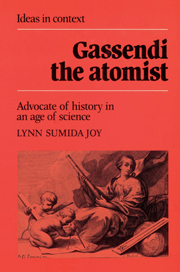Book contents
- Frontmatter
- Contents
- Preface
- List of illustrations
- INTRODUCTION
- PART 1 HUMANIST HISTORIOGRAPHY
- 2 Refuting Aristotle is not enough: how to acquire the skills of a French humanist
- 3 Gassendi's Life of Peiresc: the humanist's unattainable goal of writing a universal history
- 4 The growth of Gassendi's Epicurean project: from biography and commentary to a history of philosophy
- PART 2 PHYSICS AND THE HISTORY OF PHILOSOPHY
- List of abbreviations used in the notes
- Notes
- Index of names
4 - The growth of Gassendi's Epicurean project: from biography and commentary to a history of philosophy
Published online by Cambridge University Press: 01 September 2009
- Frontmatter
- Contents
- Preface
- List of illustrations
- INTRODUCTION
- PART 1 HUMANIST HISTORIOGRAPHY
- 2 Refuting Aristotle is not enough: how to acquire the skills of a French humanist
- 3 Gassendi's Life of Peiresc: the humanist's unattainable goal of writing a universal history
- 4 The growth of Gassendi's Epicurean project: from biography and commentary to a history of philosophy
- PART 2 PHYSICS AND THE HISTORY OF PHILOSOPHY
- List of abbreviations used in the notes
- Notes
- Index of names
Summary
As his intellectual training among the humanist historiographers makes clear, Gassendi developed his conception of the history of philosophy in large part as an alternative to what he regarded as the érudits' untenable conception of universal history. However, Gassendi never assumed that it was possible to determine the form which history as a genre should have without also determining the topics which ought to be treated as the principal subject matter of history. Hence it was crucial to his conception of the history of philosophy that his specific interests in Epicurus' life and philosophical positions originated during the same years in which he acquired an understanding of the problems of historical method. The explication of Epicurus' texts, although significant in its own right, took on an additional significance when performed by Gassendi because he increasingly considered this explication as the framework for organizing a larger history of philosophy. His advocacy of various Epicurean principles in logic, physics, and ethics thus became inseparable from his efforts to devise a genre of historical writing that would supplant the humanists' conception of universal history.
A second crucial reason for Gassendi's preoccupation with the reconstruction of Epicurus' philosophy was that his own investigations in astronomy and physics during the 1630s had brought to his attention a range of problems whose solutions required a theory of atoms as well as the revision of certain popular assumptions about Greek physics and mathematics.
- Type
- Chapter
- Information
- Gassendi the AtomistAdvocate of History in an Age of Science, pp. 66 - 80Publisher: Cambridge University PressPrint publication year: 1988



